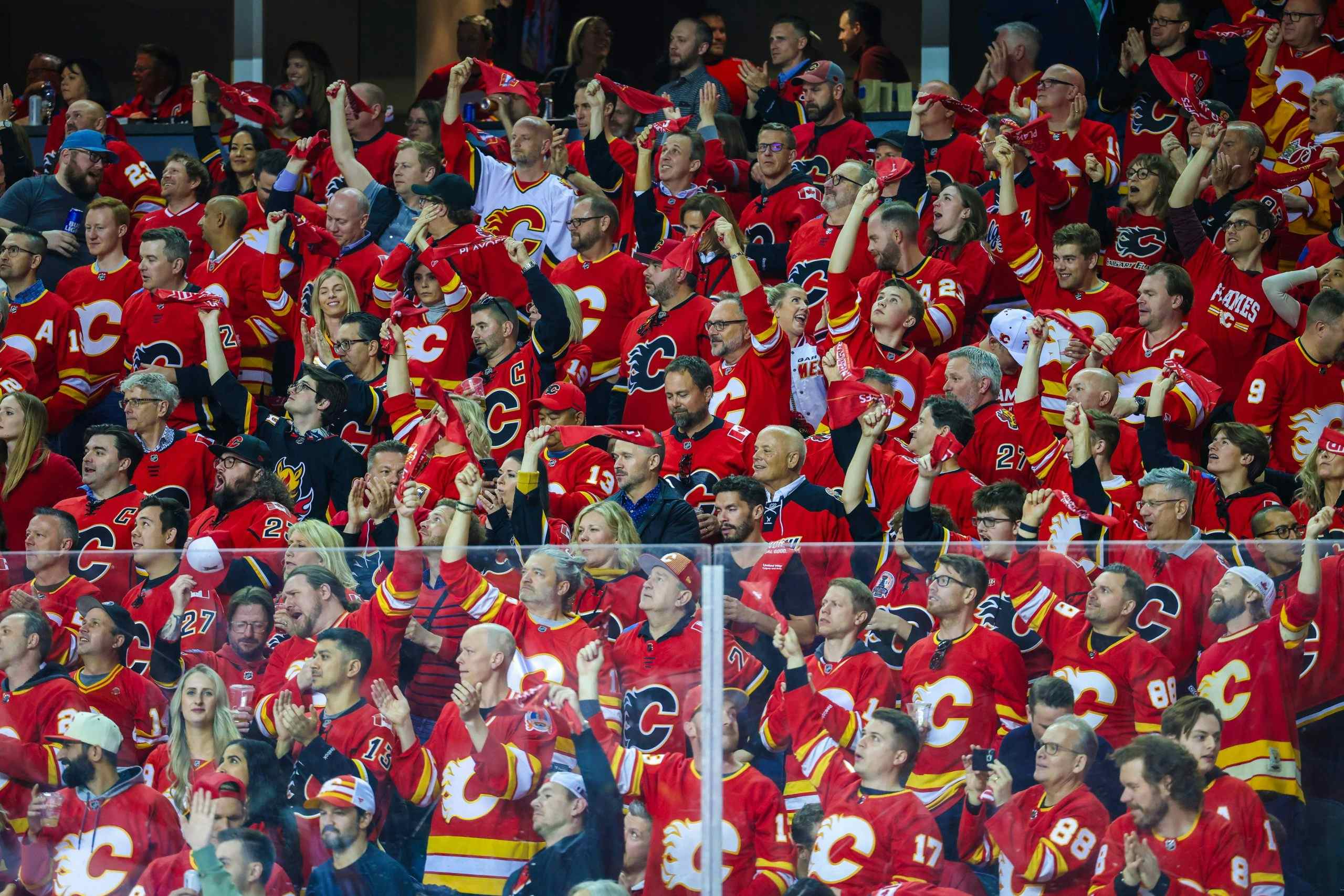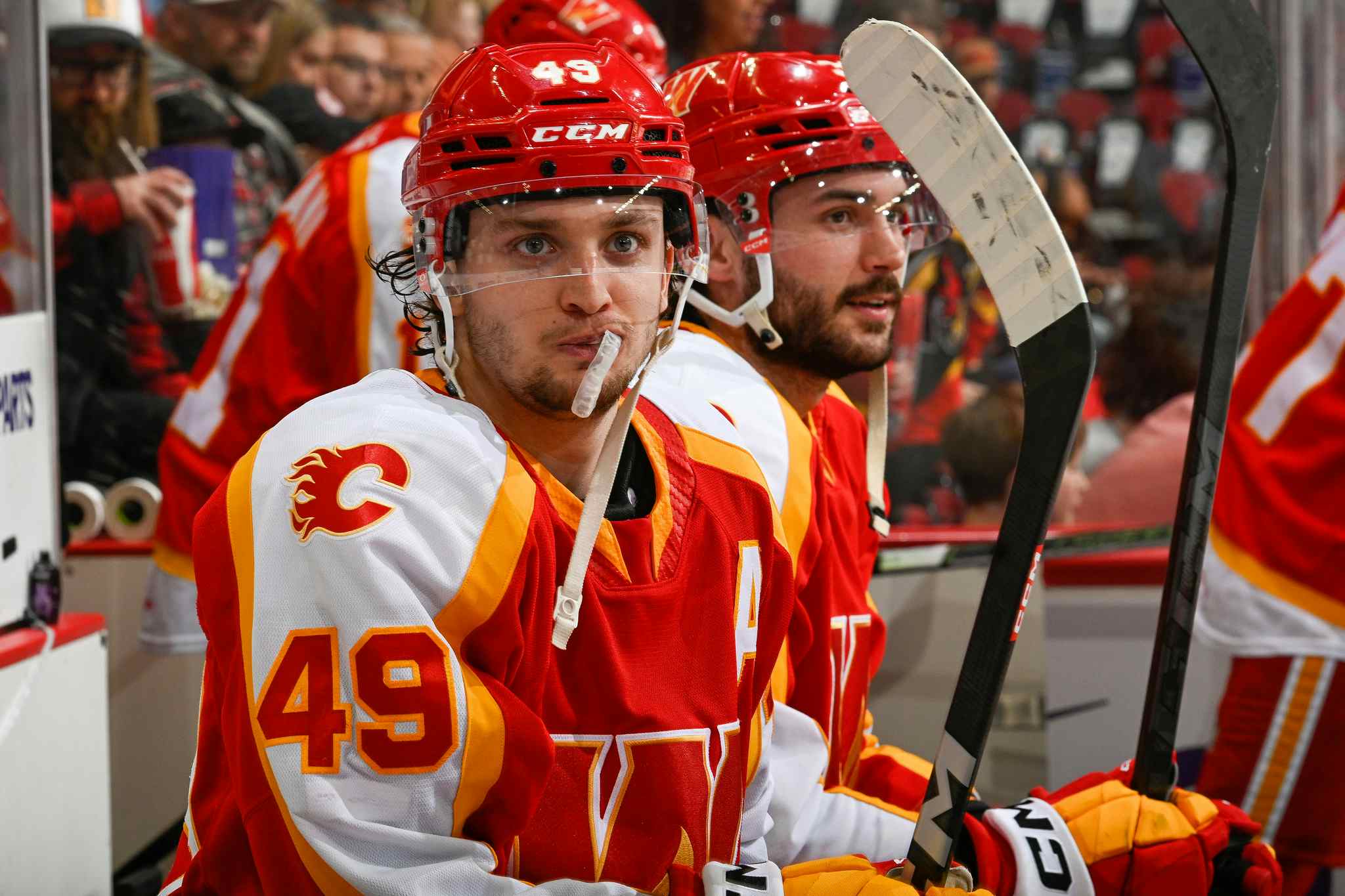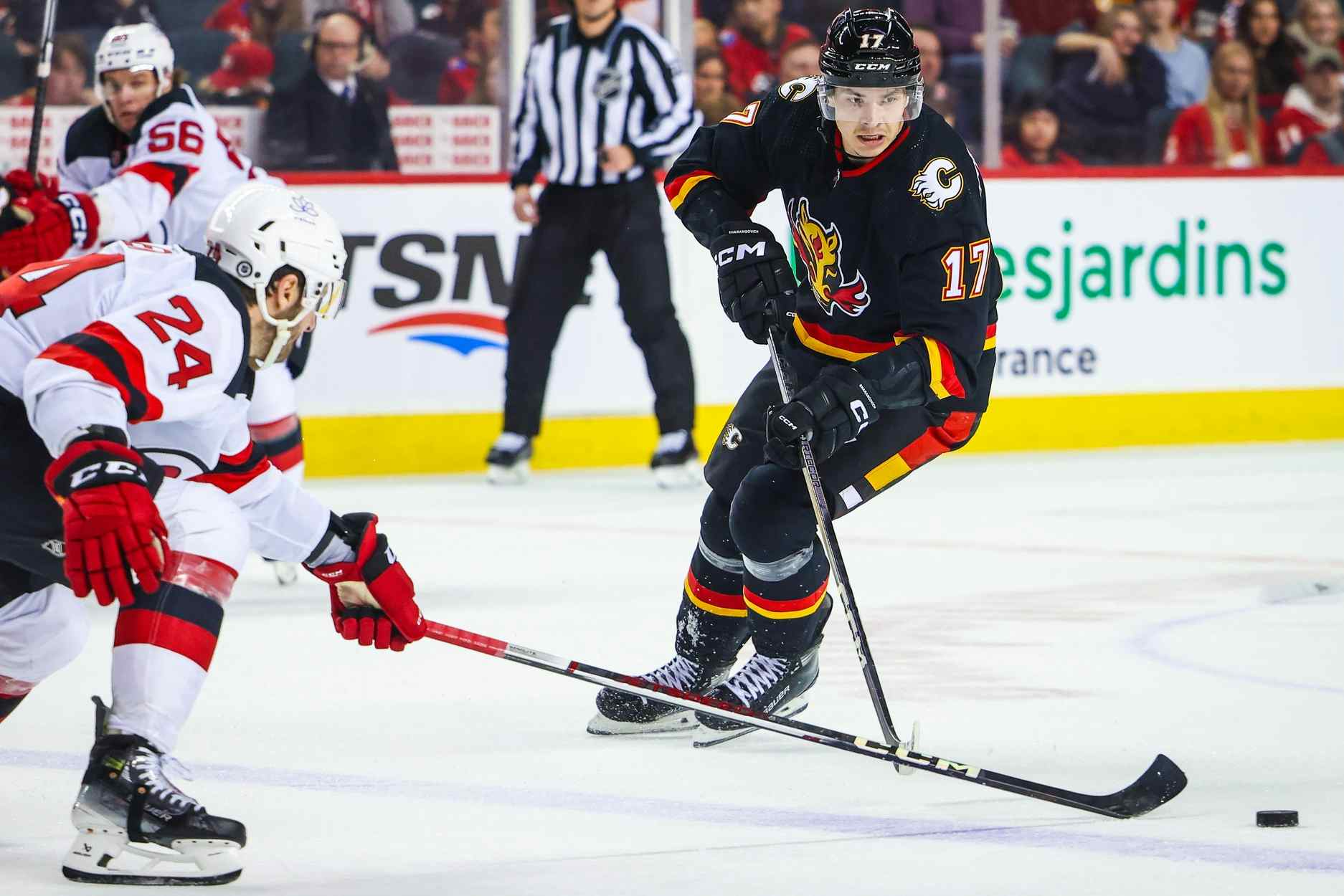The Flames in Japan
Here’s some good news: hockey is upon us. Sure, it’s the World Cup of Hockey preliminary games, but it’s still some sort of hockey. If that doesn’t satisfy you, rookie camp should be opening sometime in the next week and full camp will be the week after. In between those, you have the Young Stars tournament. And I guess the World Cup of Hockey. We have a choice between is meaningless hockey, and meaningless hockey we actually care about.
But that’s still so far away! To fill the void in the meantime, let’s blend both international hockey and Calgary Flames hockey and talk about the time they went to Japan to start the season.
A brief history of the NHL’s international experiments
Off and on (mostly off) since 1938, the NHL has sent teams overseas for exhibition matches to wow the uninitiated with the North American game. They went to Japan once in April of 1976, sending the two-year-old Washington Capitals (11 wins) and the two-year-old Kansas City Scouts (12 wins). The quality of these two teams made it seem more like exile than some sort of tour, and crowd interest was low (the NHL has always been dumb). Instead, they stuck to a market that they knew would be interested in hockey: Europe, mostly the USSR.
Also starting in 1975-76 was a series of Super Series: games between the NHL’s premier franchises and Europe’s best teams, again, mostly teams from the USSR (CSKA Moscow – the Central Red Army – was a constant fixture. They only lost once). Mostly held in North American cities, some teams went on tour to Russia, including the Flames in 1989. These Super Series and international tours continued up until 1991, when the USSR stopped being a thing.
After the Cold War ended and the barriers for European players disappeared, the NHL stopped their huge international preseason tournaments. In 1992, the Blackhawks and Canadiens played two preseason games in England; the Maple Leafs and Rangers did the same a year later. in 1994, the old Winnipeg Jets headed to Finland to play in a mini tournament with a lockout looming. After ’94, nothing.
There isn’t any given reason why the NHL took a break from their regular overseas travels, but a good guess would be that interest went down after the “East vs West” narrative meant nothing anymore. There wasn’t any more intrigue now that Russian players could come over to the NHL hassle-free.
Flash forward a couple of months to March 1995, when the IOC and the NHLPA reached an agreement to allow NHL players into the Olympics, starting with Nagano in 1998. To capitalize on the excitement, both in Japan and all over the hockey world, the NHL scheduled the Vancouver Canucks and the Mighty Ducks of Anaheim to start the 1997-98 season in Tokyo in an event called Game ONe (the NHL has also always been bad at naming things).
By the NHL’s account, Game ONe was mostly a success. Ice was a problem in Japan’s humid climate. The Yoyogi Arena, the site of both 1997 and 1998’s Game ONe, was originally the site for diving and swimming events for the 1964 Olympics, and had to be converted quickly. A dive tower was still in place for both the ’97 and ’98 games. Despite environmental factors, both 1997 games sold out and received rave reviews from the fans, leading to another Game ONe being scheduled for the following year.
Setting the scene for 1998
At the entrance to New Takanawa Prince Hotel, the official NHL
headquarters this week, there is one modest hand-painted sign barely the
size of a goal crease that reads: “WELCOME NHL CALGARY FLAMES.”Marc Purdy, San Jose Mercury News
Let’s break from the historical narrative here, ’cause I’m just going to spit some opinions. Sending the Mighty Ducks made sense because of Paul Kariya, whose Japanese descent and superstar status made him a big figure across the Pacific. Sending Vancouver made sense because of the star power of Mark Messier (lol) and Trevor Linden, and because they are Canada’s gateway to Asia. Sending these two teams in 1997 also made sense because of the Olympics, which as previously noted, were to feature the first ice hockey competition with professional players.
None of this was true for the 1998 Game ONe.
There was nothing close to a Kariya connection. The person closest to Asia would’ve been Andrei Nazarov, who was born in Chelyabinsk, a fairways west of central Russia. Darryl Sutter, then-Sharks coach, played a season in Japan and won rookie of the year, but it’s very likely that almsot no one knew that or actually witnessed that when that happened. There was no star power either. The Sharks’ Owen Nolan or Jeff Friesen hadn’t been signed yet, Gary Suter was recovering from surgery, and Andrei Zyuzin had visa issues. On the Flames side of things, they had pretty much nothing but Theo Fleury and an emerging Jarome Iginla.. (The Herald had considerable hype for Rico Fata signing and Ken Wregget playing. Yikes.)
Hosting this game post-Nagano Olympics didn’t make sense, either. After an exciting tournament featuring huge upsets on both the men’s and women’s side, fans weren’t as interested in two random teams that had no connections to the area. The best argument would be that the Japanese fans wanted an encore for the superstars they saw at the Olympics, but the only returning medalist was Valeri Bure. The U.S. Hockey team also embarrassed themselves by trashing their hotels after their loss, so the Japanese fans weren’t as receptive to North American hockey players after. The thrill was gone. Neither ’98 game sold out, with both hovering around 80% occupancy (tickets reportedly priced as high as $300 CDN).
The teams weren’t particularly excited either. The Canucks and Mighty Ducks came home from Japan absolutely exhausted. The NHL tried to accommodate, handing both teams a five game home stand after Japan. Both teams only won one of those games. It was quite clear to all NHL players what the cost of traveling to Japan was.
“It’s f—ing ridiculous… two NHL teams playing in Japan, why are we going over there? It’s not fair to the organizations. My question is why? I’m all for promoting the game by going to cities in the United
States or Canada that are going to have a team. Is Bettman going to Japan? I don’t think
so.
I can’t wait until New York or New Jersey has to go. To me, it’s
another stupid thing Bettman has come up with. I wish someone would tell
me why we’re doing this. We travel more than any team in the league and
we’re traveling some more. If it was a four or five hour trip, I’d have
no problem. I have no problem with the country or anything. We’re not
going over there sightseeing — we’re going to work. I just don’t
understand why we’re doing this.”– Bernie Nicholls
As you can tell, the Sharks weren’t particularly pleased, already having a travel-heavy schedule.
“We logged the second-most miles in the league last season (1997-98). So, I suppose, what’s another
5,000 miles?”– Darryl Sutter“I’ve been told by my bosses I shouldn’t talk any more about it
because they don’t like my answers. It still gets me
we’re going all the way to Japan for games. What? Are we going to have a
franchise over there?”– Darryl Sutter, one day later“Once you’re here and you’re playing, that’s fine. You’re here for a
reason. It’s the travel part of it I object to. Say what you want, but
we travelled [sic] the second-most miles in the league last year after Dallas.
It sounds like b—-ing and whining, but now, you just added on another
5,000 miles — one way. But hey, that’s not a big deal.”– Darryl Sutter, three days after that
(Yes, the NHL and the Sharks did actually put a gag order on their head coach. It didn’t work)
How did the Flames feel?
“It doesn’t do any good to dwell on the negatives — the time change
and everything like that, you just have to go over and
play as well as you can and then get home and get over the jet lag,
because the season doesn’t wait for you… Japan, as a country, is a great place to visit, but to go for just two games, I don’t think there’s enough time. We leave Monday and the first game is Friday. That’s four days and it’s a 15-hour time change. That just doesn’t add up.”– Tommy Albelin
“The jet lag is fine when you go over, totally fine. Coming back is what kills you. A week is not long enough to recover. It
just isn’t.”– Theo Fleury
So slightly nicer.
It wasn’t all doom and gloom though. Fleury and Bure wore kimonos and played ceremonial drums. Jarome Iginla enjoyed a McDonalds hamburger with Marty McInnis. Lanny McDonald was on hand to teach kids about hockey. Rocky Thompson tried to buy a samurai sword, and Dave Roche succeeded (in getting a plastic one). Bernie Nicholls ran up a $500 sushi bill. Mike Vernon sang karaoke and won a pie-eating contest. Even though he was a Shark for this game, he is Forever a Flame.
(The Flames have their own gallery from Japan. It’s pretty cool.)
Game ONe, Game One
San Jose Sharks 3 @ 3 Calgary Flames
SOG: Sharks 25, Flames 30
Three Stars – 1. Mike Ricci 2. Dave Roche 3. Joe Murphy
The first game featured a handful of debuts:
- This was the first game where the Flames donned ol’ Blasty, proudly displayed on captain Todd Simpson (yes seriously).
- This game was Sportsnet’s first broadcast of a Flames game. It is arguably the peak of Sportsnet’s broadcasting history.
- Wregget, Eric Charron, Greg Pankewicz, Dave Roche, and Steve Smith all made their Flames debuts this night.
- As did Rico Fata, Clarke Wilm, and some guy named Martin St. Louis, but this also counted as their NHL debuts.
Of those listed, Roche was the star of the show for the first game. After a mediocre season in the AHL, the bruiser surprised everyone and set up goals for Valeri Bure and Jason Wiemer. Andrew Cassels gave the Flames the lead midway through the third, but Mike Ricci quickly evened it up by beating Wregget. Overtime proved fruitless, and the game ended in a tie.
Ties are boring and stupid and that’s why almost every big four league has gotten rid of the idea. It’s hard to take positives from them, but for a Flames team that needed its tires pumped, they tried hard to take positives. Here are some of my favourite oddities from the game report:
- Eric Duhatschek, who made the trip with the team, said the Fleury-Cassels-St. Louis line was “surely the NHL’s smallest line.” Cassels is listed as 6’1″. When did that become short.
- On his debut, Wregget posted a .880SV%, way below average for a goaltender.
Another time, Wregget lost sight of a dump-in and thus didn’t see it
ricochet off one goalpost, then the other, before Cassels eventually
cleared it off the goalline and out of harm’s way.…Probably the most curious goal of the game came early in the third
when Rathje tied it for the Sharks on a shot from the left point bounced
off Phil Housley’s skate, then Todd Simpson’s, before it slipped past
Wregget.– Eric Duhatschek, Calgary Herald
- The Flames traded German Titov – 98 points in 135 games with Pittsburgh – for Wregget and Roche. Roche would last another 37 games in Calgary, while Wregget would only last 26 more. This team was very dumb.
- Speaking of dumbness…
Fleury called St. Louis, “a good player who’s not afraid to go to the
net and get in the corners. He gives us a lot of speed. He’s got
big-time skill, that’s for sure.”
Somehow, these quotes managed to encapsulate the general feel of the 1998-99 season. and perhaps the Young Guns era as a whole. Everything looked great, then it didn’t. Five years later, it looked worse than it actually was (bonus: the St. Louis quote was pulled from an article that focused mainly on Theo Fleury’s contract negotiations. He got traded instead).
Game ONe, Game Two
Calgary Flames 5 @ 3 San Jose SharksSOG: Flames 32, Sharks 26
Three Stars – 1. Theoren Fleury 2. Patrick Marleau 3. Derek Morris
This night was Theo’s night. He contributed to all five goals, scoring three of them. Dave “Only Good in Japan” Roche scored a goal this night, as did Derek Morris. The Flames caught some very fortunate luck, as a tired San Jose team fell into trouble quickly after Bryan Marchment received a game misconduct 10 minutes in. Without their superstars, the Sharks imploded quickly, and the Flames left Japan victors.
It was probably Fleury’s last great moment as a Flame. Five months later, he would put on another team’s jersey for the first time ever in his NHL career. This was Theo as Theo always was. Dominant on the ice, turning nothing into something, and just standing out and being the best. No forward played more than Theo did in 1997-98, and he was trending the same way pre-trade. He played defenceman minutes because no one else on these sorry Flames teams was capable.
The Japan series (I’m tired of typing Game ONe) was seen as a boost for a Flames team with little optimism on their side. After two turbulent years, and with it being quite obvious that Fleury would soon leave the team, the team needed hope. They had plenty of youth, a few prospects that were found money, a few names that were starting to establish themselves, and positive momentum. The 1997-98 Flames got their first win after seven games, and it took two full months to get five wins. They posted the lowest point total of any Flames team ever (in a full season). This was a new team, and they hoped that Japan had proven that.
The Flames came back to North America and promptly lost five of their next six games. In the 1998-99 Western Conference, that was the difference between making and missing the playoffs. To the effing Oilers.
The NHL returned to Japan once more in 2000 for a Pittsburgh-Nashville series, but stopped after that. The original plan was to go once a year for 20 years.
Sources and such
Finz & Stitches, for the Sharks side of things
Plenty of Calgary Herald articles that are from academic databases, so I can’t link to them.
Recent articles from christian tiberi





